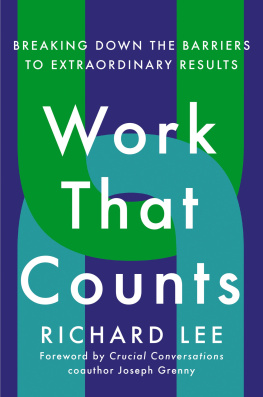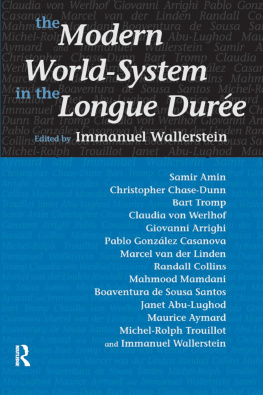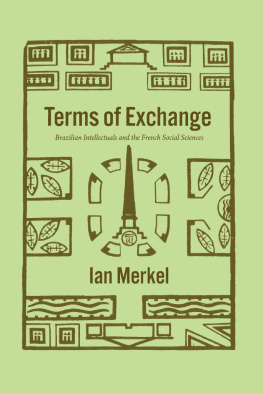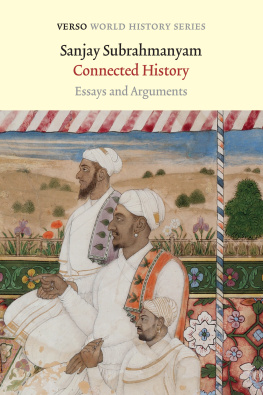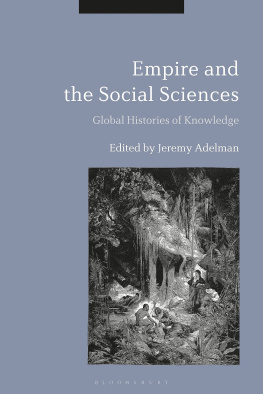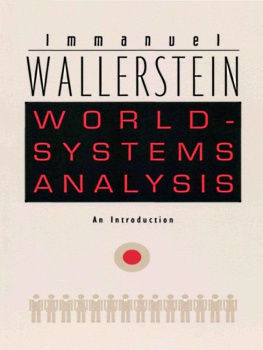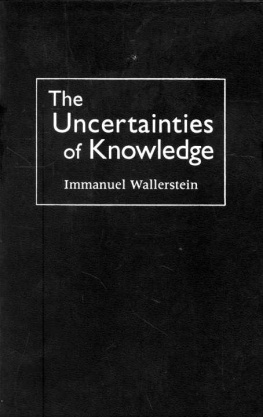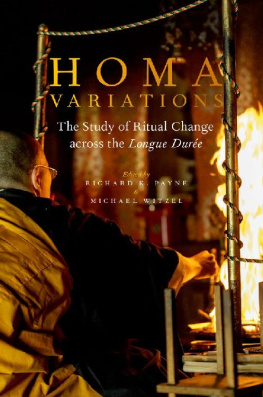FERNAND BRAUDEL CENTER
STUDIES IN HISTORICAL SOCIAL SCIENCE
Series Editor: Richard E. Lee
The Fernand Braudel Center Studies in Historical Social Science will publish works that address theoretical and empirical questions produced by scholars in or through the Fernand Braudel Center or who share its approach and concerns. It specifically seeks to promote works that contribute to the development of the world-systems perspective engaging a holistic and relational vision of the worldthe modern world-systemimplicit in historical social science, which at once takes into consideration structures (long-term regularities) and change (history). With the intellectual boundaries within the sciences/social sciences/humanities structure collapsing in the work scholars actually do, this series will offer a venue for a wide range of research that confronts the dilemmas of producing relevant accounts of historical processes in the context of the rapidly changing structures of both the social and academic world. The series will include monographs, colloquia, and collections of essays organized around specific themes.
VOLUMES IN THIS SERIES:
Questioning Nineteenth-Century Assumptions about Knowledge I: Determinism
Richard E. Lee, editor
Questioning Nineteenth-Century Assumptions about Knowledge II: Reductionism
Richard E. Lee, editor
Questioning Nineteenth-Century Assumptions about Knowledge III: Dualism
Richard E. Lee, editor
The Longue Dure and World-Systems Analysis
Richard E. Lee, editor
Published by State University of New York Press, Albany
2012 State University of New York
All rights reserved
Printed in the United States of America
No part of this book may be used or reproduced in any manner whatsoever without written permission. No part of this book may be stored in a retrieval system or transmitted in any form or by any means including electronic, electrostatic, magnetic tape, mechanical, photocopying, recording, or otherwise without the prior permission in writing of the publisher.
For information, contact State University of New York Press, Albany, NY
www.sunypress.edu
Production by Diane Ganeles
Marketing by Kate McDonnell
Library of Congress Cataloging-in-Publication Data
The longue dure and world-systems analysis / edited by Richard E. Lee ; with a new translation of
Fernand Braudel's Histoire et Sciences sociales: la longue dure by Immanuel Wallerstein.
p. cm. (Fernand Braudel Center Studies in historical social science)
Includes bibliographical references and index.
ISBN 978-1-4384-4193-1 (hardcover : alk. paper)
1. Social sciencesResearchMethodology. 2. Braudel, Fernand. I. Lee, Richard E., 1945
H62.L67 2012
300.72dc23 2011021785
10 9 8 7 6 5 4 3 2 1
Introduction
Fernand Braudel, the Longue Dure, and World-Systems Analysis
Richard E. Lee
Is it possible somehow to convey simultaneously both that conspicuous history which holds our attention by its continual and dramatic changesand that other, submerged, history, almost silent and always discreet, virtually unsuspected either by its observers or its participants, which is little touched by the obstinate erosion of time?
Fernand Braudel
F ernand Braudel, preeminently influential French historian and historiographer, has been celebrated to the extent that for decades his name has been cited in its adjectival form. More specifically, his insistence on the plurality of social times, anchored in the longue dure as structure, has been a, if not the, fundamental conceptual underpinning of world-systems analysisunderlined by the fact that, as Alain Brunhes writes, in 1977 his career was consecrated internationally, particularly in the United States, with the founding of the Fernand Braudel Center (2001: 11, translationREL) by Immanuel Wallerstein at the State University of New York at Binghamton.
Fernand Braudel was born the son of a teacher in 1902, lived his early childhood years in rural France, and went on to study history at the Sorbonne where he took his degree in 1923. He then taught the subject in Algeria from 1923 to 1932; Paris from 1932 to 1935; and Brazil from 1935 to 1937. He was appointed to the IVe section, cole Pratique des Hautes tudes, Paris in 1937, by which time he was already working on his thesis. As a German prisoner-of-war from 1940 to 1945, he finished writing most of this thesis, which he defended in 1947 and published as La Mditerrane et le monde mditerranen l'poque de Philippe II in 1949. In that same year, 1949, he was elected to the Collge de France, succeeding Lucien Febvre. Braudel was as much an organizer and institution-builder as innovator. In 1956, he became editor of the journal Annales and president of the VIe section, .P.H.., the epicenter of Annales scholarship, and from 1962 he served as chief administrator of the Maison des Sciences de l'Homme. Fernand Braudel was elected to the Acadmie Franais in 1984.
La Mditerrane, itself the product of many years of reflection and research in archives around the Mediterranean, immediately established Braudel's reputation, and his place in the Annales tradition in which his influence soon became dominant. The journal, Annales d'histoire conomique et sociale, founded by Lucien Febvre and Marc Bloch in 1929, changed its name, emphasizing its scope, to Annales: conomies, Socits, Civilisations in 1946. The movement the journal anchored exhibited a set of interconnected characteristics. History was to be totale and its writing problem-oriented; it was to be histoire science du pass, science du present in dialectical opposition to traditional history, Ranke's wie es eigentlich gewesen ist (Wallerstein 1978: 5); the result was an interdisciplinary outreach to all the sciences of man. Attention broadened from the political and the diplomatic to the economic and the social and the longue dure, the time of the long-term structures of social reality, was privileged over the time of events (only dust for Braudel).
The plurality of social times grounded by the concept of the longue dure is already explicitly specified in La Mditerrane. The structure of the book begins with the long-term history whose passage is almost imperceptible, that of man in his relationship to the environment, a history in which all change is slow, a history of constant repetition, ever-recurring cycles; continues with the medium term of slow but perceptible rhythms; and concludes with traditional historyhistory, one might say, on the scale not of man, but of individual men, what Paul Lacombe and Franois Simiand called l'histoire vnementielle, that is, the history of events: surface disturbances (Braudel 1972a: 2021).
In 1958, in response to what he considered a general crisis in the human sciences (Braudel 2009: 171) and as a plea for their rapprochement, Braudel presented an in-depth clarification of his idea of time as a social construct, rather than a simple chronological parameter, in his Histoire et Sciences sociales: La longue dure (


